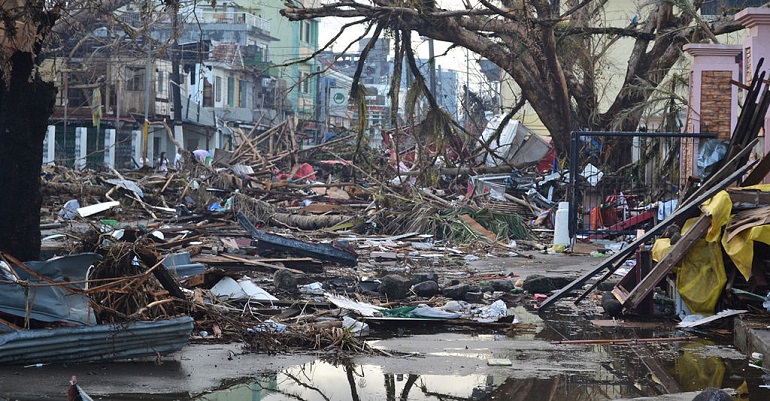Bold actions are needed to repair climate-induced loss and damage

From increasingly severe droughts in Africa to extreme flooding in Asia, millions of people are already seeing their lives and livelihoods devastated by climate change.
As Cyclone Idai, which just last month tore through Mozambique, Zimbabwe and Malawi, has shown, those who have done the least to cause the climate crisis, are already paying the greatest price.
Yet, we have seen years of stalling and delaying tactics from developed countries to obstruct the financing mechanisms so desperately needed by poorer nations to repair the loss and damage associated with climate change.
This week, the Executive Committee to the United Nations’ Warsaw International Mechanism for Loss and Damage (WIM) is meeting for the ninth time. Since its establishment in 2013, the WIM has been unable to propose concrete ways in which victims of climate change will receive reparation.
A new report by ActionAid, Market Solutions to Help Climate Victims Fail Human Rights Test, assesses the market, state and innovative financing solutions for repairing the harmful impacts of climate change. The proposed mechanisms are tested against key human rights criteria. We find that where market solutions fail our human rights test, public and innovative climate financing mechanisms offer hope.
While UN-coordinated action is slow, climate change is increasingly threatening the everyday freedoms many of us take for granted. The right to life, food, water, health and education, being able to choose to live in the community where we grew up, are all at risk. The lives and livelihoods of poor communities in developing countries are already being devastated by rising global temperatures.
People on the frontline of climate change must receive rights-based reparation. They have done the least to cause the climate crisis, and yet the market mechanisms for loss and damage finance proposed by developed countries, put the onus back on developing countries to pay for insurance premiums. Several studies show that insurance fails to repair the full extent of loss and damage – both in terms of cost and slow onset impacts, such as sea level rise and increasingly salinity and desertification – experienced by communities, particularly women already facing social, political and economic exclusion.
Market mechanisms cannot reliably raise the funds necessary to repair financial losses, which are anticipated to reach USD$300 billion per year by 2030 and to mount to approximately USD$1.2 trillion per year by 2060. They also fail to enable transparency, accountability and participatory decision-making that meaningfully includes the most vulnerable communities impacted by climate change.
Better state budgeting that shifts state subsidies away from fossil fuels and towards addressing the impacts of climate change and funding a Just Transition, as well as introducing progressive taxes such as the Climate Damages Tax (on oil, gas and coal extraction) and the Financial Transaction Tax (a small levy to raise revenue from the trading of financial instruments) emerge as clear winners.
In Bonn this week, we’re calling on the WIM to consider the innovative financing solutions, alongside public funds from rich countries, that have the capacity to repair the soaring costs of climate change and address growing global inequality.
In April 2018, British politicians, including the then co-leader of the Green Party Caroline Lucas and Barry Gardiner, shadow minister for international climate change, and the foreign minister for the South Pacific Ocean nation of Vanuatu, Ralph Regenvanu, Avinash Persaud, head of economic reconstruction of Dominica post-Hurricane Maria, and Emele Duituturaga, of the Pacific Islands Associations of NGOs, proposed the Climate Damages Tax. They contend that the tax to be levied on oil, gas and coal extraction, would pay for the costs of loss and damage; and fund ‘Just Transition’ programmes to help communities move to a fossil free economy.
This progressive tax on the fossil fuel industry would raise revenues of between USD$75-150 billion (at a rate of USD$6 per tonne of CO2) and USD$500-1,000 billion (at a rate of USD$40 per tonne of CO2) a year. It puts the onus on those responsible for the root causes of climate change impacts and introduces a regulatory incentive on the fossil fuel giants. The 2017 Carbon Majors Study found that just 100 fossil fuel companies were responsible for 71 per cent of anthropogenic GHG emissions.
A Financial Transaction Tax (FTT) covering the European Union putting a levy on shares and bonds at 0.1% and derivative agreements at 0.01% has the potential to raise USD$63billion, and a similar global FTT could raise significantly more, given the scale of financial instrument trading internationally. Those engaging in financial trading have the ability to contribute towards repairing the rights of those impacted most by climate change. A March 2019 report (by BankTrack, Rainforest Action Network, Indigenous Environmental Network and others) revealed that 33 global banks have provided USD$1.9 trillion in funding to fossil fuel companies since the Paris Agreement was adopted in December 2015.
Rich countries must move away from obstructive politics and allow WIM to implement its full mandate, particularly of raising financial resources for developing countries. The WIM has the potential to retrieve, receive and allocate funds in a transformative way that redresses the fundamental social, economic, political and material exclusions that many of the most vulnerable climate change victims face. In this way, financing for loss and damage can also harness the potential to address deep rooted inequalities and inequities that are exacerbated by extreme and slow-onset climate change events.
Harpreet Kaur Paul is a policy and campaign strategist. She is exploring avenues to ensure justice for victims of loss and damage associated with climate change through her PhD research at Warwick Law School.
Harjeet Singh is ActionAid International’s global lead on climate change. He supports countries across the world on policy advocacy related to climate change.




Leave a Reply